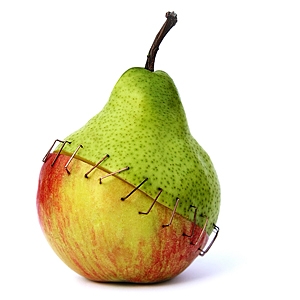
Are There Scary GMOs on Your Plate?
A GMO, also referred to as “frankenfood”, is a genetically modified organism created through the process of selecting, splicing, removing, and/or adding desired genes. There has been an increase in the amount of GMOs grown in the US, but what are the reasons?
Here’s a brief history on the upsurge of GMOs:
- 1973 – Herbert Boyer and Stanley Cohen invented the process of genetic engineering
- 1980 – Corporations and businesses were applying for patents for the items they modified
- 1982 – FDA approved use of medicine produced by GMOs
- 1990s – USDA approved a modified tomato for commercial use
- 2000 – FDA rule that GMO labeling is not mandatory
- 2012 & 2013: California (Prop 37) & States repeatedly veto bills to label GMOs
The ruling by the FDA has created a lot of controversy between the people and government. Many believe that they have a right to know what they are consuming. Although 90% of Americans want mandatory GMO labeling laws, 71 senators rejected states’ rights to label GMOs (including both PA senators, Casey & Toomey) in an amendment to the 2013 Farm Bill on May 24th, on the eve of worldwide March against Monsanto.
Consumers must weigh the pros and cons of GMOs when it comes to important decisions that concern health and safety.
There are some benefits of GMOs:
- Increased food supply. The main reason for creating GMOs is to make crops pest and disease resistant and drought tolerant. By being resistant to pests and disease and tolerant to droughts, crops are able to grow in higher numbers. A higher yield would be able to feed more people or provide biofuels.
- Better food quality and taste. Modification can make fruits sweeter, peppers spicier, and vegetables last longer.
- Fewer animal health problems. Genetic modification can result in animals that are resistant to diseases and can better withstand typical factory farm conditions.
- More benefits in the foods themselves. Some foods like Golden Rice have been modified to contain additional vitamins and minerals like Vitamin A. Crops like these are used to help people in countries where there is an inadequate supply of a variety of foods.
- Vaccine possibilities. Many of our medicines come from plants. By genetically modifying some plants, we can improve their quality. These better quality plants could be used for, hopefully, better medicine. There are studies that are currently being conducted with bananas to produce newer and safer vaccines against viruses such as Hepatitis B.
However, with benefits come GMO consequences:
- Introducing allergens and toxins to foods. Genetically modified foods are able to cause increased allergic reactions in people. Some people who easily react to certain foods or food characteristics have already been reporting increased allergic reactions to GMOs.
- Environmental risks. GMOs can be classified as an alien species—not occurring naturally in a certain area. By being able to resist pests and diseases, they can spread easily over a field, competing with native species of crops. There could be cross breeding and cross-pollination between genetically modified and non-genetically modified foods. An unapproved genetically engineered wheat was just found in Oregon last week, with crop trials ending in 2005 and the farmer without an idea of how it got there. Herbicide resistant plants could spread their qualities to weeds, which would make them harder to kill.
- Agriculture giant bullies. Monsanto, Monsanto, Monsanto. Where do we begin? Beyond many shady practices, false advertising & controlling the US Soy market, Monsanto is hated by millions. In addition, Monsanto is able to sue farmers if their GM wheat or products are growing – regardless of how they got there. Plus, if they’re harder to kill, it’s more difficult for farmers to get them off their property. The USDA has verified some GMO safety from Monsanto, which is validating its own products. (Hmmm…)
- Sick or dying animals. There have been incidents of animals dying after eating genetically modified foods that are identical to foods being sold to humans. Animals are used to consuming natural foods, and being suddenly introduced to them could have a negative impact on their body.
- Hurting exports. GMOs are banned in a least 27 countries around the world, so they are not able to import genetically modified products from the US. If that GMO-wheat from Oregon was previously exported, it can have disastrous effects on our global trade.
- No long-term effects are known. Although GMOs have been around for a while, there is a sudden increase in the number of GMOs being sold and consumed. GMOs have been a hit starting only about 20 years ago. Concerns over the consumption of modified food has gained popularity in the past few years, so there are no studies on the side effects of consuming GMOs.
The consequences (especially the unknown) lead many consumers to veer away from the frankenfoods. We previously mentioned 5 ways to avoid GMOs in your food and have a couple new ones below.
4 ways to avoid GMOs in your food:
- Buy organic or local
- Grow your own food
- Buy foods labeled “Non-GMO”
- Avoid high-risk foods. The most genetically modified foods are:
- Corn
- Soybeans
- Tomatoes
- Dairy products
Check out more tips to avoiding GMOs (plus sweet animations)!
May 25th March Against Monsanto in Philadelphia
Philadelphia participated in the March Against Monsanto on May 25th. Participants had creative outfits & tongue-in-cheek signs. Here’s a few photo highlights from the event:
What are your thoughts on GMOs and our right to know what we consume? Let us know down below!
Photo: SantaCruz.com








